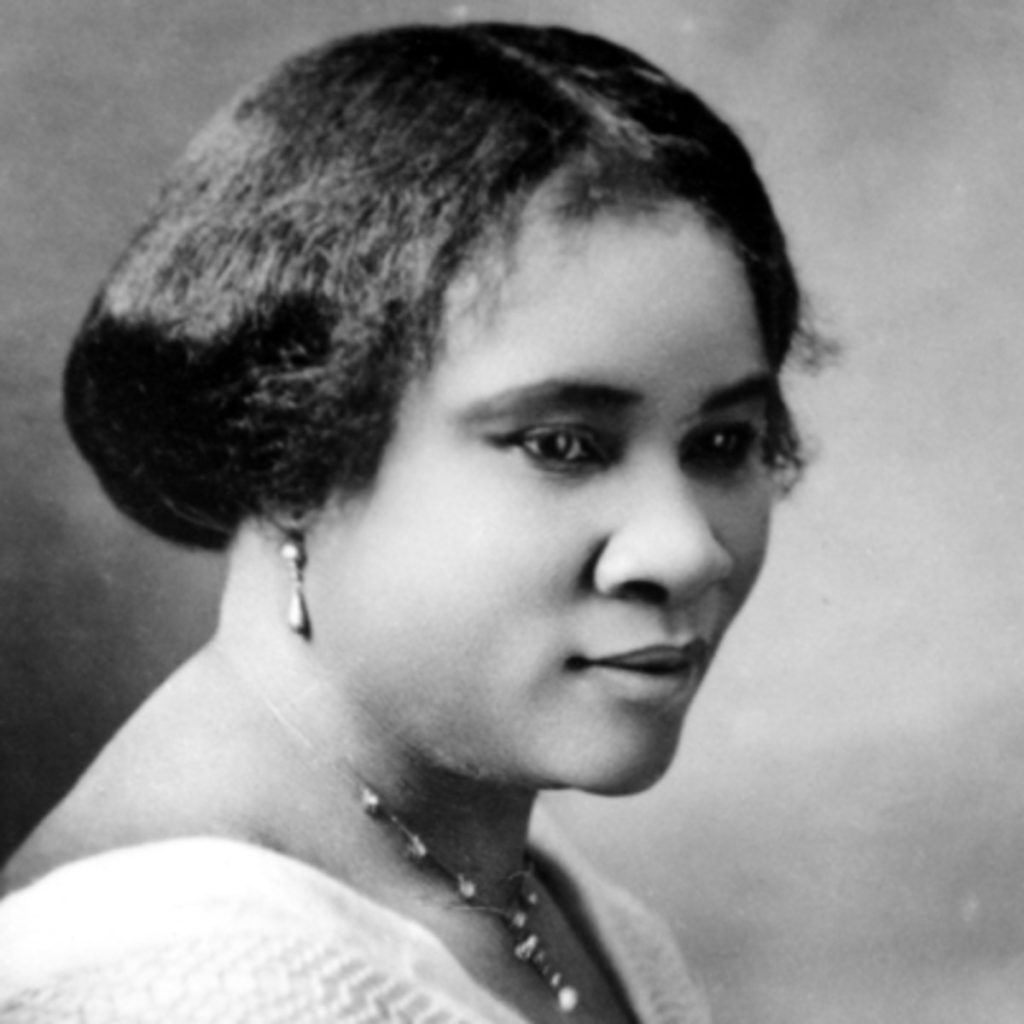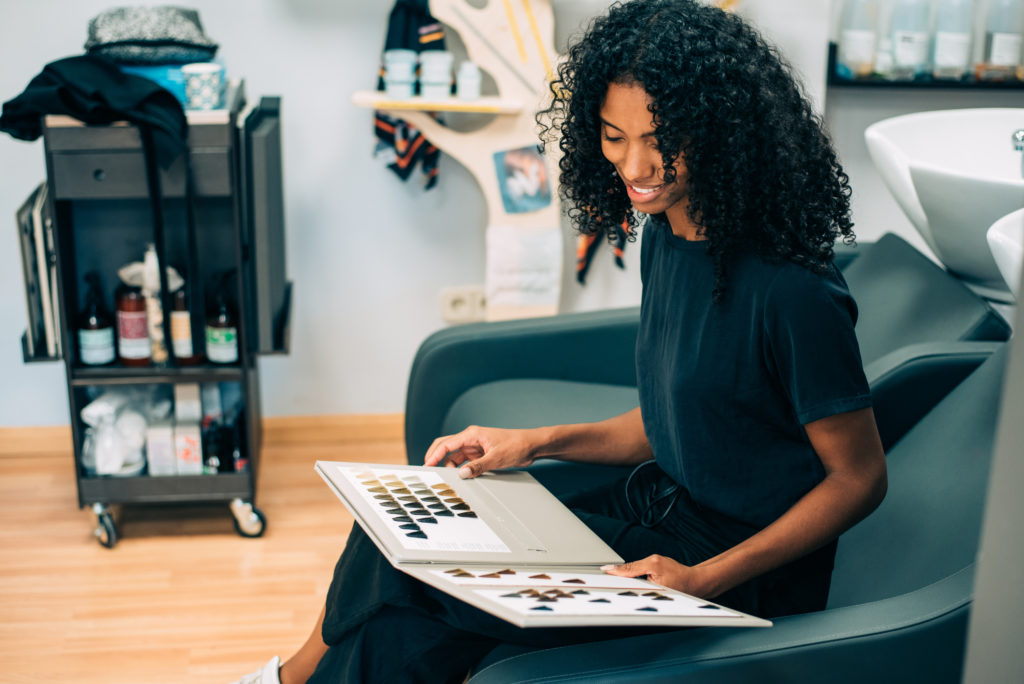Celebrating Black History Month and Madam C.J. Walker: Entrepreneur, Philanthropist, Activist and Self-Made Business Woman
Lisa Powers
EVP, Public Affairs & Communications, Personal Care Products Council

“I had to make my own living and my own opportunity. But I made it! Don’t sit down and wait for the opportunities to come. Get up and make them.”
-Madam Walker
Madam C.J. Walker started her business at the turn of the century, at a time when women, including women of color, had few rights and little opportunity. Along with her contemporaries Helena Rubenstein, who opened her first beauty salon, the Valaze House of Beauty in 1902, and Elizabeth Arden, who’s renowned Red Door Salon was established in 1910, these women were pioneers in the beauty industry. They knew that the end game was less about beauty itself, although the benefits of self-confidence derived from these products were already well-established, it was more about female empowerment.
Madam Walker’s great-great-granddaughter and biographer A’Lelia Bundles sat down with us to tell us more about this amazing trailblazer.
Q. What inspired Madam C. J. Walker to start her business and why did it become such an important force for black women more than a century ago?
“It is really interesting to look at Elizabeth Arden, Helena Rubenstein and Madam Walker as part of a group of women who, at the turn of the last century, were pioneers of this modern haircare and cosmetics industry. They really did see a need in the market at a time when men were either ignoring the business aspects or didn’t view it as something important. And, it’s really amazing how they took home recipes and concoctions that were sold locally or regionally and turned those businesses into international operations with distribution and marketing. These women are part of the pantheon that created this industry.
Madam Walker saw a need because she had a personal problem-she had challenges with losing her hair- and she developed a shampoo and ointment with sulfur that healed the scalp, which became Madam Walker’s Wonderful Hair Grower, her most important product. The women whom she first treated just wanted to have healthier hair, and then she realized, that it wasn’t just about helping women have healthier hair, it was about helping women become economically independent. So in many ways, she was healing their scalps, but in other ways she was healing their souls and self-confidence. She trained thousands of women, traveled all over the United Sates, demonstrating her product and over a period of time, the hair care products became a means to a more significant end. Once she saw this transformation happening in women, she realized they needed to, not just look better and feel better, but they needed education and they needed economic opportunities.”

Q. Born Sarah Breedlove in 1867 in Louisiana, of humble beginnings, Madam Walker became a celebrated entrepreneur, philanthropist and social activist. Reflecting on her legacy, it is clear that she had purpose beyond making money, and that she intended to use her platform to create positive social impacts in communities across the country. Not only an advocate for women’s empowerment, Madam Walker also believed strongly in supporting communities. What can you tell us about how she used her platform to inspire positive change?
“At her first convention of sales agents in 1917, Madam Walker gave prizes to the women who had sold the most products and brought in the most new agents. She also gave prizes to women whose local clubs and chapters had contributed the most to charity. During her keynote address, she said, I want others to look at us and realize that as Walker Agents, we care not just about ourselves, but about others. And at the end of the convention, the women sent a telegram to President Woodrow Wilson urging him to support legislation to make lynching a federal crime. Madam Walker viewed her agents as community leaders and as women who were making a difference in the community. As she traveled around demonstrating her products, she would give a lecture that was more about what was happening in the black community, in education, and in politics, and try to identify other women who could be leaders in their communities. The seeds that Madam Walker planted recognized that we need to feel good about ourselves, but we also need education and financial independence.”
Q. Do you think business has an obligation to provide more than shareholder value? Is there a broader remit for the modern company, like your great-great- grandmother envisioned?
“There are some truly wealthy people today, who believe they have an obligation to give back, because others have sacrificed. Greed is not good. Corporations need to give to their communities. Corporations need to give back and there are a lot of great models today. I grew up in Indianapolis and the Lilly Endowment has been extremely generous to the community and has made Indianapolis a better place because of the investments it makes in education and cultural activities. So you can tell the difference in a city where a locally based corporation really wants to improve its community and not just profit from its community. You can truly tell the difference when the leadership of a company has a generous spirit and believes in its people.”
Q. Madam Walker’s successful direct sales business model was built on training and educating women in small towns across the country, providing them with skills and the opportunity to become economically independent and provide for their families. The beauty sector today is characterized by the employment opportunities it presents for women, people of color and small businesses. Today the sector has more women in management positions than the national average. What would Madam Walker say about the opportunities for women in business today? Have we made any progress?
“I think she would be happy to see so many women CEOs both in companies that they founded themselves, and in companies founded by other people in which they have worked their way up through the corporation. But, I think that she would also be frustrated, that less than 2% of venture capital is invested in women owned businesses, and businesses owned by women of color. She’d be happy to see there are more women millionaires, and more than one black woman billionaire, but she would think that there are still not enough women running the c- suites and not enough money being invested in women’s ventures.”

Q. What started as a restorative scalp treatment, Madam C.J. Walker’s Wonderful Hair Grower, became a thriving hair care company. Leveraging innovative marketing and sales approaches like using her likeness on packaging, with before and after imagery, placing her products on college campuses, and offering sales incentives, Madam Walker was well ahead of her time. Describing her concept and method of hair growth as beauty culture, and linking it to the positive appearance and conduct of black women, Madam Walker was in so many ways, without social media as we know it today, an influencer. Who are the role models and influencers that inform your attitudes about the world?
“My mother. She was very smart and knew how to bring people together and had very strong opinions. My mother was Vice President of the Madam C.J. Walker Manufacturing Company while I was growing up. And of course, studying the details of Madam Walker’s life and the breadth of her experience as a philanthropist, entrepreneur and suffragette and all of those other dimensions of her life has influenced me greatly. Marie Johns, with whom I grew up in Indianapolis, is someone I admire because she has managed to be a CEO, but she was also the person who cooks Thanksgiving dinner, or calls her friends and has them come over. The women who lives where they can be successful but also have generous spirits are the ones I admire most.”
Q. One of the most successful women entrepreneurs and the first self-made female millionaire, Madam Walker was a visionary with extraordinary courage, who pushed boundaries and challenged the status quo. What advice do you think Madam Walker would offer to young women starting their own businesses today?
“What she often said was first you must have a really great product and then you have to advertise and promote that product. If she were alive today, she would be on Instagram- she was an early adopter- and she understood the power of advertising. One of the reasons she moved to Indianapolis was because she had a mail order business and it had good distribution, because of its location and the train, but also because it had three black newspapers, including a nationally distributed newspaper, the Indianapolis Freeman, which was like a black USA Today, and she took out an ad in the paper, with a before and after picture, that demonstrated the product’s performance and included testimonials. She also surrounded herself with a strong executive team and she had a knack for selecting the right people. Lastly, she understood the power of philanthropy and doing for others. Her philanthropy she did out of the goodness of her heart, but it also elevated her in the eyes of the public.”
About A’Lelia Bundles
Author and journalist A’Lelia Bundles writes biographies about the amazing women in her family: entrepreneur Madam C. J. Walker and Harlem Renaissance icon A’Lelia Walker. She also frequently lectures at conferences, colleges, corporations and other venues about entrepreneurship, philanthropy, financial literacy and women’s and African American studies or history. She is at work on her fifth book, The Joy Goddess of Harlem: A’Lelia Walker and the Harlem Renaissance, about her great-grandmother whose parties, arts patronage and travels helped define the era.
Images 1 and 2 courtesy of Madam Walker Family Archives/A’Lelia Bundles
